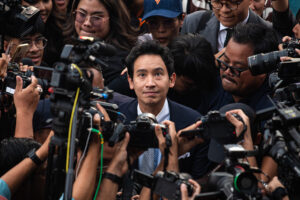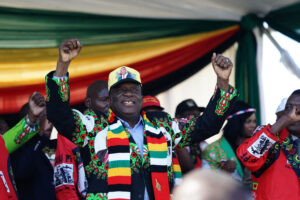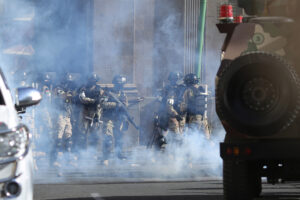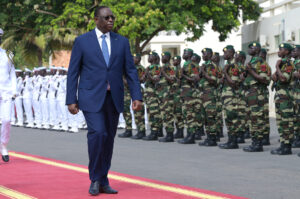April 2024, Volume 35, Issue 2
The Truth About Africa’s Coups
Praetorian politics are not making a comeback. Africa’s recent putsches have more to do with democracy’s failure to deliver than any fondness for military rule.
April 2024, Volume 35, Issue 2
Praetorian politics are not making a comeback. Africa’s recent putsches have more to do with democracy’s failure to deliver than any fondness for military rule.

October 2022, Volume 33, Issue 4
Many fear that coups are making a comeback. While this is not true, one thing is alarming: Anti-coup norms are starting to erode.
April 2022, Volume 33, Issue 2
In 2021, autocrats’ efforts to reshape the global order enabled heavier repression and brazen power grabs, while democracies faltered. Is this a tipping point?


January 2022, Volume 33, Issue 1
President Kais Saied’s power grab has crushed Tunisian democracy, returning the country to the old playbook of Arab dictators past and present.
January 2022, Volume 33, Issue 1
The country’s armed forces opened the door to democracy, only to help slam it shut a decade later. A desire for prestige and political influence has turned them into an autocrat’s accomplice.
April 2021, Volume 32, Issue 2
The military could not bear Aung San Suu Kyi’s enduring popularity and her party’s continued success at the polls. But the generals may have miscalculated how much the people detest them.


October 2019, Volume 30, Issue 4
Amid mass protests, the personalist autocracy of longtime Sudanese president Omar al-Bashir fell to an April 2019 coup. With the country now being governed by a council composed of both opposition leaders and powerful security-service coupmakers, prospects for democratization remain uncertain.
October 2019, Volume 30, Issue 4
The military junta that seized power in 2014 finally organized an election in 2019, but with the goal of preventing rather than facilitating a return to civilian rule.
October 2019, Volume 30, Issue 4
In 2011–13, the undemocratic political outlook of both secular and Islamist actors helped to ensure the failure of democracy in Egypt. Today, the populace appears to have backed away from democratic demands, yet pockets of resilient activism offer a basis for hope.
January 2017, Volume 28, Issue 1
Following the end of the Cold War, an international norm against coups began gaining strength, but it seems to have lost momentum in recent years. What has happened?

October 2008, Volume 19, Issue 4
Torn between populism and those who fail to respect democratic limits in combating it, Thailand badly needs to locate a middle ground where the best of its old traditions can help it adjust to the new challenges that it faces.
July 2007, Volume 18, Issue 3
Since the early 1990s, many African countries have undergone political liberalization, and so far this trend has been accompanied by a significant drop in the incidence of military coups.
July 2001, Volume 12, Issue 3
Following a military coup in 1999 and flawed and violence-ridden elections in 2000, democracy in Côte d’Ivoire faces an uphill battle against the forces of xenophobia and ethnic chauvinism.
April 1998, Volume 9, Issue 2
Read the full essay here.
January 1992, Volume 3, Issue 1
Read the full essay here.
Fall 1991, Volume 2, Issue 4
Read the full essay here.
Fall 1991, Volume 2, Issue 4
Read the full essay here.
Fall 1990, Volume 1, Issue 4
Read the full essay here.
Fall 1990, Volume 1, Issue 4
Read the full essay here.
Winter 1990, Volume 1, Issue 1
Over the past several years, the world has come to see the crisis in Panama mainly as a confrontation between the United States and Panama's military strongman, General Manuel Antonio Noriega. But this perception – reinforced lately by press reports on last October's failed coup attempt – is badly mistaken.

Thai politics appears to be in a loop, with the military keeping people’s democratic hopes under wraps. But there is reason to believe the streets won’t be quiet for long.

Ten years after the revolution, the lessons for protecting a budding democracy and guarding against violent extremism are clear.

The continent’s aspiring dictators are attacking term limits with a vengeance, finding new ways to avoid handing over power. But citizens are overwhelmingly against it — and can help keep their leaders in check.

The South American country was once the most coup-prone in the world. Many thought it had closed that chapter. So why did it just suffer another attempted coup?

A string of Kremlin-backed military coups have brought a collection of juntas to power. The West should resist calls to placate them, and instead stick to its values and push for a return to civilian rule.

If you want to understand why generals support a presidential power grab, then you need to understand the logic that motivates them. Why they leave the barracks — and what we must do to get them to stand down.

President Macky Sall has called off his country’s presidential election just weeks ahead of the vote. His unconstitutional decree will not only keep him in power, but threatens to throw Senegal into violent chaos.